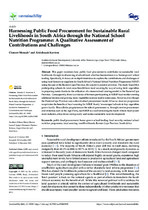Harnessing public food procurement for sustainable rural livelihoods in South Africa through the national school nutrition programme: A qualitative assessment of contributions and challenges
Abstract
This paper examines how public food procurements contributes to sustainable rural
livelihoods through local sourcing of school food, what has become known as ‘home-grown’ school
feeding. Specifically, it draws on in-depth interviews to explore the contributions and challenges of
using local farmers as suppliers for South Africa’s National School Nutrition Programme (NSNP)
using the case of the Eastern Cape Province, the country’s poorest province. The study found that
participating schools in rural areas benefit from local sourcing by way of using fresh vegetables
in preparing meals thanks to the utilisation of a decentralised catering model in the Eastern Cape
Province. Consequently, there is evidence of farmers participating in NSNP food market earning
additional income and growing more vegetables on more land in some cases. However, even though
the Eastern Cape Province uses a decentralised procurement model, it has no clear-cut programme
to optimise the benefits of local sourcing for NSNP. It only ‘encourages’ schools to buy vegetables
grown locally. This calls for pragmatism on the side of government to, through creative procurement
and initiatives such as the Agri-Parks, use NSNP as a tool for making the South African food system
more inclusive, drive down rural poverty and realise sustainable rural development.

